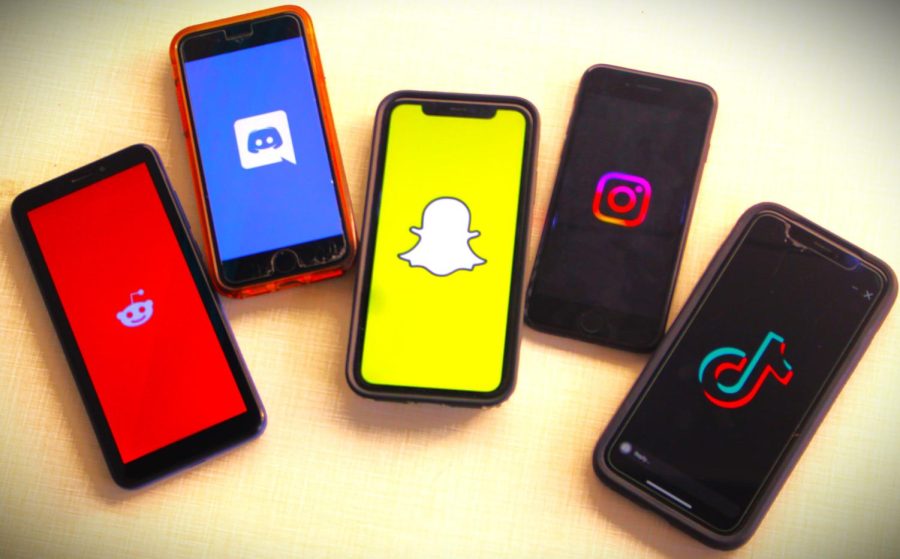Life Through a Screen: How social media is detrimental to teenage mental health (Editorial)
five phones displaying the start screens of social media apps
Being a teenager 20 years ago was like driving on a flat plain, but now it is like riding a roller coaster with thousands of ups and downs. Before Instagram and Snapchat, high school students did not have to worry about their faces being morphed into someone they cannot recognize when they look into the mirror. These filters and the constant pressure of comparison makes social media is detrimental to teenage mental health. Too much of it is extremely unhealthy.
Tik Tok stars and Instagram models normalize extremely unhealthy eating and exercising habits, causing people who actively use these apps may develop body dysmorphia or anorexia, bulimia, and other diagnosable eating disorders. While policies on Tik Tok and Instagram clearly state that promoting eating disorders is strictly not allowed, the algorithm makes it easy to slip small things in posts that encourage these things. The people behind these apps are at fault for letting this slide, but the community can also help this problem by not interacting with these posts.
Is there REALLY such a thing as Snapchat dysmorphia? Although some people find this to be foolish, teenagers can vouch that this is a real problem. Teenagers will do anything in their power to look like the filters created by Snapchat including plastic surgery. This may not seem like a problem to some people, especially older generations, however, according to 2017 data from the American Academy of Facial Plastic and Reconstructive Surgery, 55% of plastic surgeons have reported that they have had a patient ask for cosmetic surgery because of social media. This statistic had increased 13% since 2016. Younger generations will look up to teenagers now, and if they pick up on Snapchat dysmorphia, chances are they will go through the same thing.
During the pandemic, there was more time than ever to scroll through social media for hours on end. An excessive amount of social media screen time everyday is unhealthy physically and mentally. Some people decide to use social media as a distraction from their sadness, but according to a study from the University of Pennsylvania, 140 undergraduates limit their time on Facebook, Snapchat, and Instagram to only 10 minutes a day. This study showed that the participants had significantly lower levels of depression and loneliness. It is safe to say social media does more bad than good, and it is possible to become addicted to these apps by using them for hours on end everyday.
So, how do we get out of this cycle? There are some benefits to social media, including how easy it is to access news and meet new people. Although there are some pros, an unhealthy amount of social media will always be damaging to livelihood. It is basically impossible to eliminate social media completely, but there are ways to develop new habits to stop checking these apps more than a healthy amount. A study from Harvard University showed that teens using 5 hours per day on their phones are 2x more likely to show depressive symptoms, so it is extremely important to limit as much time as possible. It is beneficial to pick a time of night where you put social media away. Also, spending time with people or doing things you are passionate about can help you spend time away from your phone. Choosing not to interact with accounts that will cause unwanted self doubt will also be beneficial to preventing social media addictions.
As time goes on, more and more new apps will come out that will amaze all age groups, but teenagers are a main target for social media. This has become a problem considering how many insecurities teenagers may develop while growing. Normalizing unrealistic habits and beauty standards is clearly going to hurt our future generations and it is time to prevent them from feeling the same self consciousness that teenagers in 2022 do.
Disclaimer: Articles designated as “Editorial” represent the views and opinions of the author, not the 2021-2022 Periscope staff, CHS/CASD administration, or the CHS student body.
Want to help the Herd? Please consider supporting the Periscope program. Your donation will support the student journalists of CHS and allow us to purchase equipment, send students to workshops/camps, and cover our annual website hosting costs.

Lyric Koch is a junior at Carlisle High School. She is thrilled to take on Editor in Chief this year. When she is not working, in her free time she loves...

Kirsten Bisconer is a sophomore at CHS. It's her first year on the periscope staff. She is excited to take many photos for articles and to continue the...




























































































